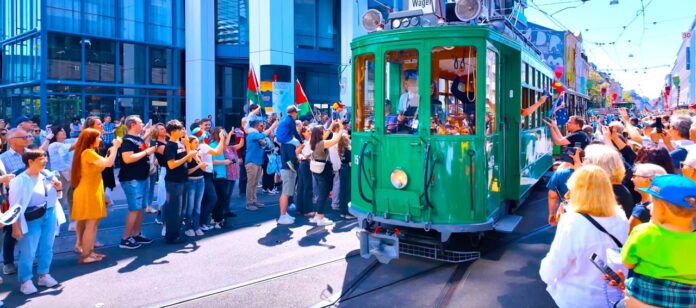From rainbow sculptures to roaming awareness teams, Basel is determined to make Eurovision 2025 safe, joyful and inclusive
The Swiss city of Basel is pulling out all the stops as it prepares to host the 2025 Eurovision Song Contest for the first time in 36 years. With turquoise flags fluttering from lamp posts, art exhibitions springing up across the city, and a karaoke tram on standby, Basel’s message is bold and simple: everyone is welcome.
The contest returns to Switzerland thanks to non-binary singer Nemo’s win last year with The Code, marking the country’s first victory since Celine Dion’s triumph in 1988. This year, all eyes turn to St. Jakobshalle, where executive head of production Tobias Aberg is overseeing a massive build-out of the stage and infrastructure.
The city’s preparations go beyond staging. Basel is creating what it calls a “unique” safety concept, led by 1,300 police officers, mobile awareness teams in pink jackets, and 24-hour safe spaces for those facing harassment, violence or discrimination. Security director Stephanie Eymann calls it a “low-threshold” support system designed to make reporting and seeking help easier for anyone, especially visitors hesitant to approach authorities.
Basel is leaning into its image as a European crossroads. “We are the heart of Europe,” declared city leader Conradin Cramer, citing the city’s borders with France and Germany and its medieval history of welcoming free thinkers. “Whoever you are—gay, straight, young, old, male, female or non-binary—you’re welcome here.”
The message resonates strongly in a year marked by ongoing protests over the Gaza conflict and growing tensions around inclusion and diversity across Europe and beyond. Last year’s Eurovision in Malmö drew thousands of pro-Palestinian demonstrators, and Basel is expecting similar scenes. Police stress peaceful protest is permitted, so long as public safety is not compromised.
Meanwhile, culture and celebration are at the heart of the festivities. The 1.3km turquoise carpet stretching from the historic town hall across the Rhine to the Eurovision village will be the longest in contest history. Basel’s 40 museums and galleries are joining the fun too, with the Beyeler Foundation hosting a show of works by Warhol, Rothko, Kandinsky and Picasso, topped by Ugo Rondinone’s We Are Poems rainbow sculpture.
For those without tickets, which sold out within minutes, Basel promises a city-wide party, with concerts, art installations and competitions for school bands. The top four will perform on the Eurovision stage.
Yet the road to hosting hasn’t been entirely smooth. Conservative Christian groups triggered a referendum to block public funds, arguing that Eurovision undermines family values. Voters rejected the effort resoundingly, with 66.6% approving a nearly $40m budget for the contest. “This is how Switzerland works,” shrugged Cramer, “but the result shows our people really want this.”
However, tensions persist over the European Broadcasting Union’s (EBU) strict rules banning non-national flags on stage, including Pride or gender identity flags. LGBTQ+ groups like Pink Cross slammed the policy as a “slap in the face,” especially after Nemo’s landmark win. Last year, Nemo had to smuggle in a non-binary flag to wave during their performance.
The EBU defended the rules as a means to preserve balance, claiming Eurovision’s values of inclusion need no symbols. But Cramer disagrees. “Europe stands for coming together. That should include everyone, visibly.”
And as for getting to the show, Swiss efficiency ensures no one will miss a beat. Trains are being doubled, trams will run around the clock—and for those who want to belt out Eurovision classics, Basel offers a free 90-minute ride on a karaoke tram.
